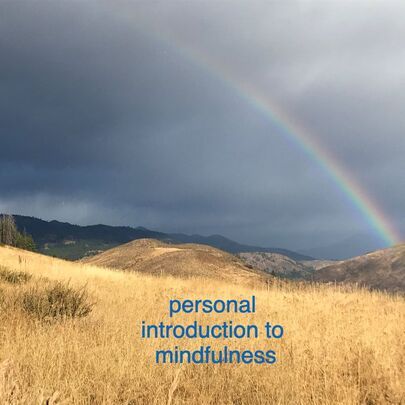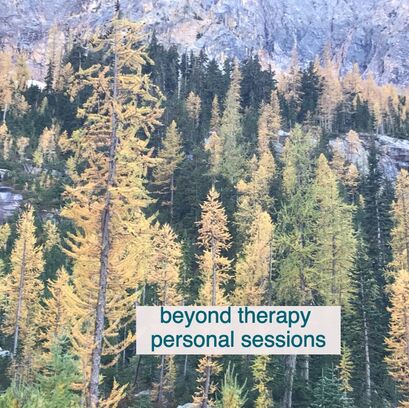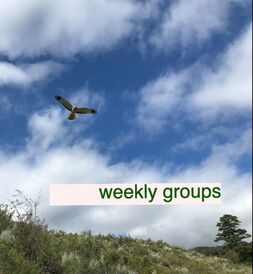
NEW CLASS click for details and registration
2024 Introduction to Mindfulness
5 week class in Twisp or on Zoom
Thursdays, 5:30 - 6:45
February 15 - March 14
An introduction to mindfulness meditation based on Dr. Amishi Jha's research with teaching mindfulness to first responders and military personnel:
Become familiar with 4 meditation techniques
Recognize three ways the mind pays attention
Learn how 12 minutes of (almost) daily practice will keep you focused, kind, and calm.

Personal Sessions and Weekly Groups
We all need tools for stress. Is mindfulness right for you?
Check out the work with me page, or contact me for a free consultation or general information. I have been practicing mindfulness for over 25 years, and coaching others for over 10 years.
Easy online scheduler - affordable private sessions, $40-60
Call (509)449-2594 or email -schedule a free consultation
free weekly drop in groups, in person & online
We all need tools for stress. Is mindfulness right for you?
Check out the work with me page, or contact me for a free consultation or general information. I have been practicing mindfulness for over 25 years, and coaching others for over 10 years.
Easy online scheduler - affordable private sessions, $40-60
Call (509)449-2594 or email -schedule a free consultation
free weekly drop in groups, in person & online
"For me, mindfulness practice with Sharon has been life changing! I can’t say enough about how it has impacted me and the people around me. My husband is Sharon’s biggest fan!
I have learned techniques to understand and manage my mind and emotions that are truly empowering. Probably the most helpful part of working with Sharon is that when I feel stuck I can schedule a private session to help me get unstuck! "
|
Mindfulness meditation is more powerful with others!
Meditate with us, in-person, or online. Everyone is welcome, we meet on Mondays, Wednesday, Thursdays and Fridays. Each day is a little different, find a group that works for you. It's free, you can listen in, ask a question, and/or join the discussion |
what's different about mindfulness?
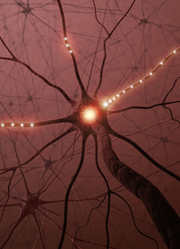
Mindfulness is for everybody, we all have habits that are not helpful. Are you Impatient? Anxious? In pain? Mindful awareness is a window into how habitual thoughts affect our life and our health. Neuroscientists say "neurons that fire together wire together". Our thoughts, for better or worse, flow through our mind, shape our brain, and influence our perception. Habitual thoughts form neural superhighways which become our mental/emotional patterns. We find ourselves repeating things we don't mean, behaving in ways we regret, chasing the same thoughts, even making difficult situations worse. Practicing mindfulness gives us the tools to be the person we want to be, and to respond intentionally to whatever happens.
about mindfulness-based stress reduction
Mindfulness-Based Stress Reduction (MBSR) is the classic introduction to secular mindfulness. Dr. Jon Kabat-Zinn pioneered MBSR in 1979 at the University of Massachusetts Medical Center. It proved to be so effective at easing chronic pain that within a year it was made part of the Department of Medicine. Today it is offered in hundreds of hospitals, and clinics worldwide. MBSR is supported by research in medicine, neuroscience, and psychology, and recommended by the Mayo Clinic, and the National Institute of Health. Mindfulness is helpful for a wide range of medical symptoms and psychological distress including:
mindfulness in the news
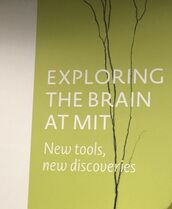
How I Rewired My Brain simple, everyday changes to our lives can alter our brains and change how they work. the author put herself into a scanner to find out, Melissa Hogenboom, BBC
Mindfulness Shows Promise for PTSD in Cardiac Arrest Survivors, Science Daily, Feb 2024
Mindfulness Meditation to Control Pain, Jon Kabat-Zinn recommends the body scan mindfulness exercise as the best form of mindfulness meditation for pain conditions, Harvard Health, March 2023
highly recommended AUDIO. Mindfulness and Cancer- interesting information from psycho-social oncology researcher Linda Carlson. She pioneered the application of mindfulness and contemplative practice for cancer patients, evidence-based research - please pass it on, Mind & Life Institute, also available as a podcast, (mind & life app)
To help kids deal with trauma, mindfulness over the loudspeaker. - a pre-recorded mindfulness program for schools helps kids, In 2022, the Sullivan Elementary School received its first "A," a grade based on standardized test scores ... It was – a huge shift from receiving an "F" grade five years before. Principal McMeen says mindfulness has played a role in turning the school around. -Pien Huang, NPR.
Mindfulness Practice May Improve Children's Mental Health, good results from an study in which children practiced mindfulness at home using an app, MIT News, Anne Trafton, Oct, 2023
Daily Meditation May Work As Well As A Popular Drug To Calm Anxiety, Study Finds, April Fulton, NPR, For the first time, scientists compared patients who took mindfulness Based Stress Reduction to patients who took escitalopram, the generic name of the widely-prescribed anxiety drug Lexapro. They found that both interventions worked equally well in reducing debilitating anxiety symptoms.
Find Your Focus: Own Your Attention in 12 Minutes a Day Neuroscientist Amishi Jha explores mindfulness training for ther US Department of Defenses in the most high-stress scenarios imaginable. Mindful, 2021
How Much Do Your Genes Shape Your Politics - Thomas B. Edsall -facisinating roundup of research on how genes influence thought (understanding genetic influence, makes us more tolerant of difference) NY Times, June 1
Mindfulness Hurts, That's Why it Works, Facing the painful parts of life head-on is the only way to feel at home with yourself, Arthur C. Brooks, Atlantic,
How To Boost Happiness Hormones Like Serotonin and Dopamine in Every Day Life Good tips for positive energy, including a discussion of the hormones that generate happiness. Mercey Livingston, CNET, Oct 2020
Are we Morally Obligated to Meditate A growing body of neuroscience research shows that meditation can make us better to each other. Sigal Samuel a skeptic reviews the science, after 8 weeks of mediation, he found he was able to stay calm during a family visit, Jan 2020
Mindfulness Practice Benefits Elders with Mild Cognitive Impairment, Elders who practiced mindfulness had better brain network efficiency. Psychiatry and Clinical Neurosciences, December, 2019
Why Stress is Dangerous, Storoni, a surgeon explores how chronic stress may change the structure of the brain. BBC Future, August, 2019
Scientists’ Understanding of Anxiety is Radically Evolving-But How Long will it Take for Treatments to Catch Up? -Adam Piore, Overview of the changing understanding of anxiety, and the limitations of current medical treatment…"many clinicians say one of the most exciting trends in mental health… is the rise in the use of a technique that is thousands of years old and actually predates many of the current treatments: mindfulness." Newsweek, Sept 2019,
How People Want to Feel.. influences their emotions, Alex Shashkevich, New research finds that our underlying motivation determines how much we allow other to influence our feelings, such as anger. Stanford University News, June, 2019
When a Stress Expert Battles Mental Illness –Brad Stulberg, a columnist for Outside Magazine, describes his unexpected bout with clinical anxiety
The Latest in Military Strategy: Mindfulness -Matt Richtel, NY Times. Troops who went through a month-long mindfulness training. were better able to discern key information under chaotic circumstances and experienced increases in working memory function. The soldiers also reported making fewer cognitive errors than service members who did not use mindfulness. April, 2019
With 90% of Avalanches Triggered by Victims, Should Mindfulness Become a Backcountry Tool? Eli Francovich, Incorporating mindfulness into avalanche safety classes to help people make better decisions in changing conditions. Spokesman-Review, February 2019
Mindfulness effectively reduces eye pressure in open-angle glaucoma, Medical Express Patients with primary open angle glaucoma showed significant improvements after participating in a program of mindfulness meditation focused on breathing, Nov 2018,
,
©2017 Sharon Cohen MFA, RYT, Methow Valley Wellness Center, Winthrop, WA 509-449-2594 sharon@mindfulmethow.com
